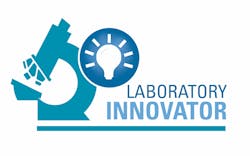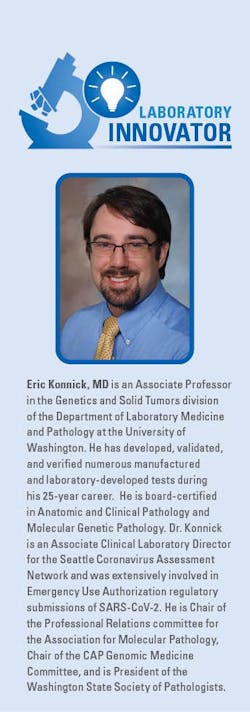So all understand, would you please explain what laboratory-developed tests (LDTs) are and provide examples of these types of tests?
First, AMP prefers to use the term laboratory developed testing procedures (LDPs) instead of LDTs since these tests are essential clinical services. LDPs are vital laboratory services that are designed, developed, validated, performed, and interpreted by board-certified professionals in regulated clinical laboratories. They are being used across a range of applications including oncology, rare disease diagnosis, newborn screening, infectious disease testing, and more. Additionally, laboratories often modify FDA-cleared or approved test kits to improve performance or expand the utility of the tests to their specific patient populations. LDPs are not commercially manufactured, nor boxed and shipped as medical devices, and should not be regulated that way. The licensed and board-certified individuals involved in using LDPs are highly trained professionals, not manufacturers.
The proposed rule threatens the ability of professionals in clinical laboratories to create, adapt, and modify LDPs to meet patients’ needs, account for supply chain issues, reflect advances in scientific understanding and practice standards, and improve performance characteristics.
Would you please describe why AMP and other organizations disagree with the FDA’s proposed rule to regulate LDTs as medical devices?
AMP strongly opposes FDA’s proposal to regulate these testing services as medical devices. As detailed in our comments,1 the FDA’s proposed changes to the definition of an in vitro diagnostic product, and its plan to end what it refers to as “enforcement discretion,” would result in laboratory professionals being treated as manufacturers. Laboratory professionals are board-certified healthcare providers who develop and rigorously ensure the analytic and clinical validity of their LDPs and who interpret their results within the context of available patient clinical information and other relevant test results. Treating laboratory professionals as product manufacturers is inappropriate and unjustified, and it will unequivocally hinder and harm patient care.
Do you think that current laboratory test validation and quality management requirements are sufficient, or would improvements by other means be beneficial?
AMP and our members have consistently advocated for up-to-date regulations and continuous quality improvement of the field. We have spent the past 10 years collaborating with many professional societies, patient advocates, diagnostic companies, hospitals, academic centers, independent laboratories, regulators, and other stakeholders from across the country to help educate lawmakers on alternative proposals.
We have long maintained that the involvement of appropriately trained and qualified laboratory professionals is critical to the development of accurate and reliable LDPs, as well as for correct utilization, interpretation, and appropriate application of molecular test results. The AMP proposal2 modernizes the current Clinical Laboratory Improvement Amendments (CLIA) regulatory program and provides assurance of quality, analytical validity, and clinical validity. Our approach would provide a far more appropriate and efficient regulatory framework that ensures access to necessary patient care while continuing to foster rapid innovation and the promise of new diagnostic technologies.
Patient safety has been identified as a concern with LDTs by the FDA. What are your patient care concerns if these tests had to undergo FDA review?
All LDPs should be accurate, precise, clinically relevant, and monitored for continued quality performance, and patients should receive the most appropriate tests and procedures for their medical evaluation and/or clinical condition. It is unacceptable when any test does not meet these standards, and it is important that this country continues to have a federal regulatory approach that works toward ensuring that patients receive the appropriate and effective level of care.
It is irresponsible of the FDA to make broad claims asserting that LDPs are low quality and harm patients when, in fact, the data support that the vast majority of LDPs produce accurate results that successfully contribute to the management of patient care. If there are any systematic concerns about the quality of the majority of LDPs used for patient care, that information would be available based on information acquired by third-party accrediting organizations who must verify that CLIA standards are met, test the proficiency of laboratories at least on a biannual basis, and report to CMS when patients and/or the public are in immediate jeopardy as a result of a laboratory error.
It is also disingenuous to convey to the public that FDA authorization would deter all harm, and indeed, no single entity could. It is for this reason that AMP instead advocates for a multi-layered approach where CLIA, state, and third-party requirements work in concert with a peer-review-based system and the interest of appropriately trained professionals to provide the best care possible for their patients.
The American public saw firsthand how inappropriate FDA medical regulations are for LDPs during the early days of the COVID-19 pandemic. FDA enforcement, allowed under the Public Health Emergency declaration, prevented many laboratory professionals from mitigating the flaw in the first test kit provided by the Centers for Disease Control and Prevention. FDA’s use of the emergency use authorization process overwhelmed the agency, contributed to testing scarcity, and eliminated the opportunity to immediately contain and slow the spread of this highly transmissible virus in those critical first weeks of the pandemic in this country.
This same entity should not be responsible for regulating all LDPs for conditions ranging from infectious diseases to cancer.
The shortages in the laboratory workforce are well known. How could the proposed regulation impact an already overburdened healthcare community?
If the proposed rule is finalized, there would be numerous immediate and long-term consequences that would decimate the clinical laboratory community, disrupt patient care, and restrict training opportunities. Hospital-based clinical laboratories may have no choice but to outsource clinical testing. As these centers are critical for training pathologists, residents, medical students, clinical laboratory scientists, technicians, PhDs, and clinical fellows, there will be limited ability for the future of our workforce to be trained in areas that are vitally important to general laboratory medicine, let alone personalized medicine. While the effects will be felt in every region of the United States, AMP is especially concerned about the impacts on underserved populations and rural communities that already struggle with adequate staffing by qualified personnel.
Regarding molecular diagnostics, the Government Accountability Office found the medical genetic workforce to be quite limited with only approximately 4,700 genetic counselors and 1,240 medical geneticists certified to provide care in the United States in 2020.3 In addition, the GAO reports an average of only seven genetic counselors for every 500,000 people and only two medical geneticists per every 500,000 people. To address the looming 20% retirement rate in laboratory personnel, plus the current 13% vacancy rate, over 25 professional organizations formed the Medical and Public Health Laboratory Workforce Coalition this year.4 There are also well publicized shortages of medical laboratory scientists, histotechs, and laboratory physicians (pathologists). Policymakers need to invest in expanding the diagnostic and molecular laboratory workforce to meet the demands of our healthcare system, which will only grow as precision medicine utilization increases, not implement rules that will reduce training opportunities for these professionals.
If the FDA’s proposed rule is finalized, it is likely that the Agency, companies, and other organizations will also be looking to hire individuals with laboratory expertise to review submissions and perform other regulatory functions. Given the current shortages and limited training programs, it is hard to envision how both the clinical and regulatory functions will be accommodated. While the FDA could hire non-laboratory professionals for some functions, that would be much less effective and efficient, and would likely lead to numerous delays.
REFERENCES
1. Califf RM. Amp.org. Published 2023. Accessed December 19, 2023. https://www.amp.org/AMP/assets/File/advocacy/AMP_LDT_Proposed_Rule_Comments_FINAL_12_2_23.pdf?pass=49.
2. Definitions “. Section 2. Definitions. Amp.org. Accessed December 19, 2023. https://www.amp.org/AMP/assets/File/advocacy/Amendments%20to%20CLIA%20modernization%20legislative%20text%2011_7_23%20FINAL.pdf?pass=42.
3. U.S. Government Accountability Office. Genetic services: Information on genetic counselor and medical geneticist workforces. Gao.gov. Accessed December 19, 2023. https://www.gao.gov/products/gao-20-593.
4. Medical and public health laboratory workforce coalition. Mphlcoalition.org. Accessed December 19, 2023. https://www.mphlcoalition.org/.






